Blockchain Technology, Fintech & Cryptocurrency Transactions
Our Digital Assets Practice provides comprehensive offshore expertise on Blockchain, cryptocurrencies and digital assets on Cayman Islands law and BVI law.
The Cayman Islands are one of the most popular jurisdictions in the world for Blockchain related businesses and cryptocurrency funds, with the largest initial coin offering (ICO) ever recorded and a growing ecosystem of blockchain technology companies.
Our attorneys are very experienced in this fast-paced and rapidly growing industry and ready to assist with:
-
.png)
- Counseling clients on their initial coin or token offerings or security token offerings (ICOs/ITOs/STOs) in the Cayman Islands, including structuring issues, SAFT/SAFTE agreements, reviewing the White Paper and the terms and conditions of the blockchain platform, and drafting the token sale documentation
- Advising clients on issues related to offshore investment funds investing in digital assets and specific risk factors
- Advising on tokenized funds investing in venture capital or real estate
- Advising on corporate, financing and intellectual property issues related to investments in blockchain companies and joint venture projects
- Advising token issuers and cryptocurrency funds on compliance with the Cayman Islands Anti-Money Laundering (AML) regulations.
Blockchain and cryptocurrencies - Basic concepts, current developments and risk factors.
Basic Concepts - What is the difference between a block, a node and a fork?
It all started 10 years ago.
From 2008 until 2014-2015, the bitcoin movement went relatively unnoticed. Massive interest in cryptocurrencies really started in 2016-2017, as the evolution of the total market capitalization shows. However, now that cryptocurrencies and especially the Blockchain, the technology behind bitcoin have drawn attention, a massive growth is expected. Still, nobody knows who Satoshi Nakamoto really is ...
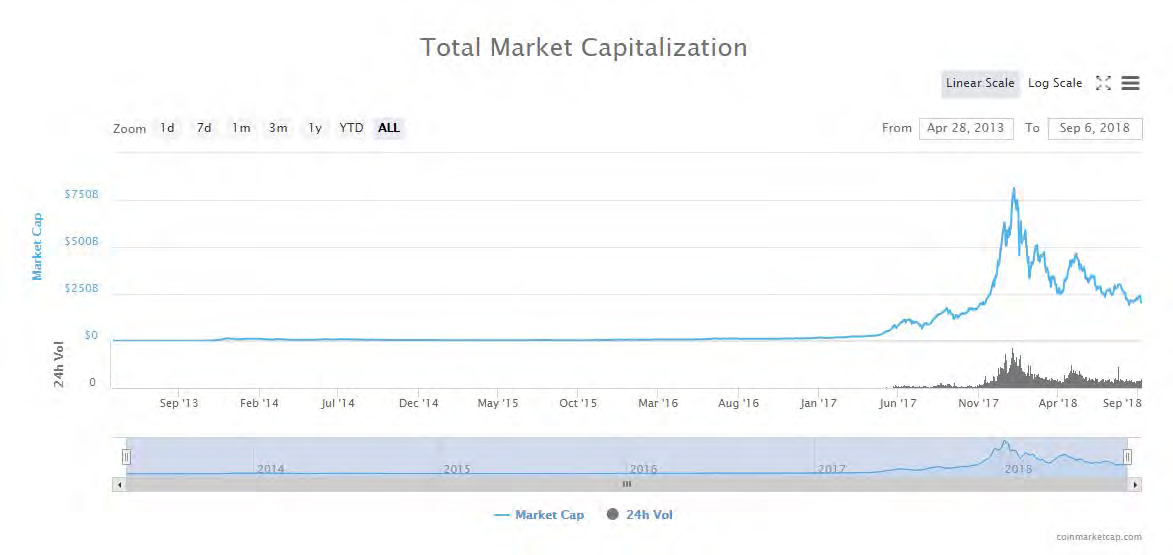
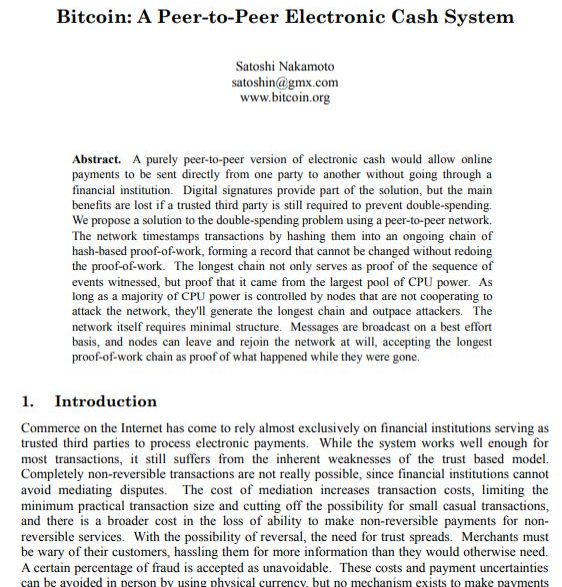
What is the Blockchain?
Blockchain is a distributed ledger technology, based on encryption, open-source code and peer-to-peer sharing.
- A Block is a permanent time-stamped record of certain transactions on the Bitcoin network, like a page of a ledger book.
- A Node is a computer connected to the Blockchain network, which receives, verifies and stores Blocks, in exchange for a reward and/or transaction fees paid in Bitcoin.
- A transaction is permanently recorded and non-alterable if verified by 50%+1 of the Nodes. However, transactions after 3-4 confirmations are considered as definitely confirmed.
- A Fork happens when the Blockchain diverges into two potential paths forward. This happened several times with Bitcoin and Ethereum, the two main networks.
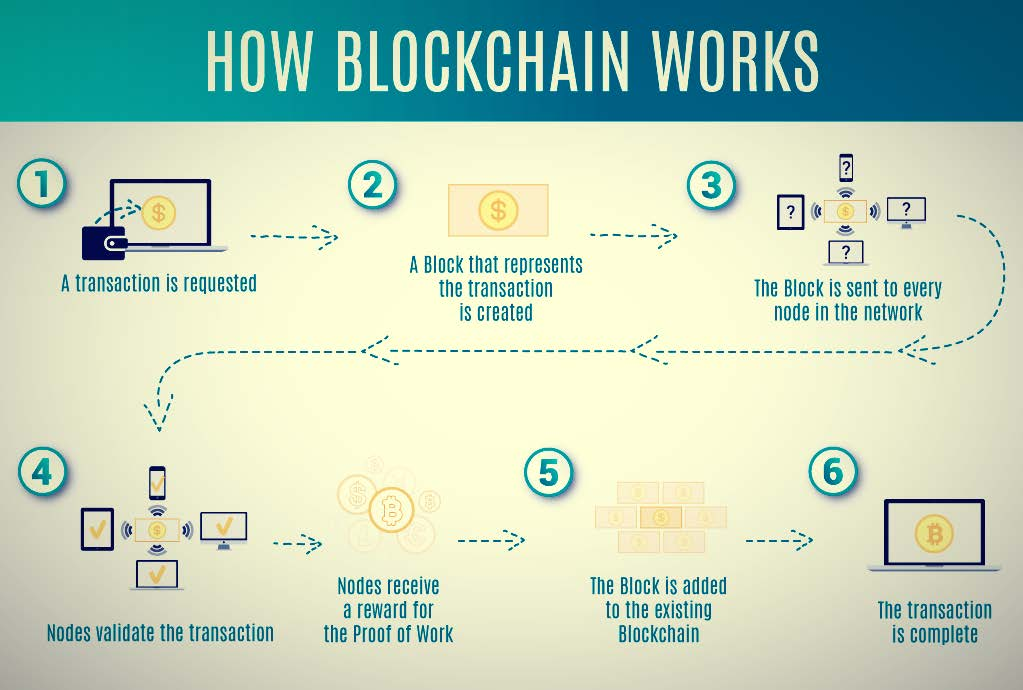
Developing Ecosystem - In addition to cryptocurrencies and Blockchain technology companies, a host of new service providers and crypto-exchanges have appeared.
Main cryptocurrencies
In addition to Bitcoin, major cryptocurrencies include Ethereum, Ripple, Litecoin, EOS, etc. A list of the top 20 cryptocurrencies in terms of market capitalization from https://coinmarketcap.com/
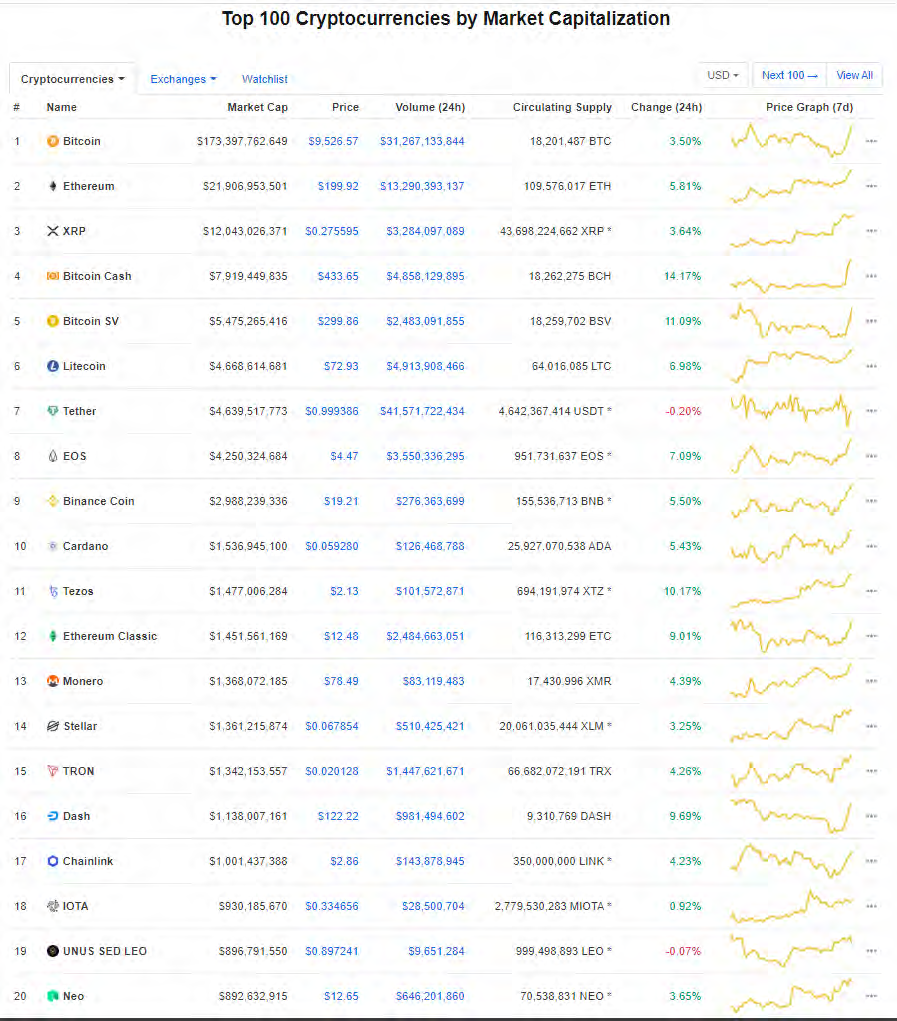

Fun facts: Periodic Table of Cryptocurrencies according to their appearance
However, not all cryptocurrencies survive.
Since cryptocurrencies have no intrinsic value and are not backed by any assets, their market value is determined purely by offer and demand rules, which depend on general sentiment, expectation of profits, and supporting Blockchain networks and ecosystem, among others.
Because not all Blockchain networks are designed exactly the same, some cryptocurrencies are considered more secure or more reliable, others execute faster, or provide more anonymity. Some cryptocurrencies can be used as “fuel” to execute certain transactions. For example, the Ethereum network has grown mainly because it supports thousands of user-friendly build-your-own-token projects.
In summary, some cryptocurrencies may be even more risky and volatile. Some exchanges do not accept certain cryptocurrencies or tokens.
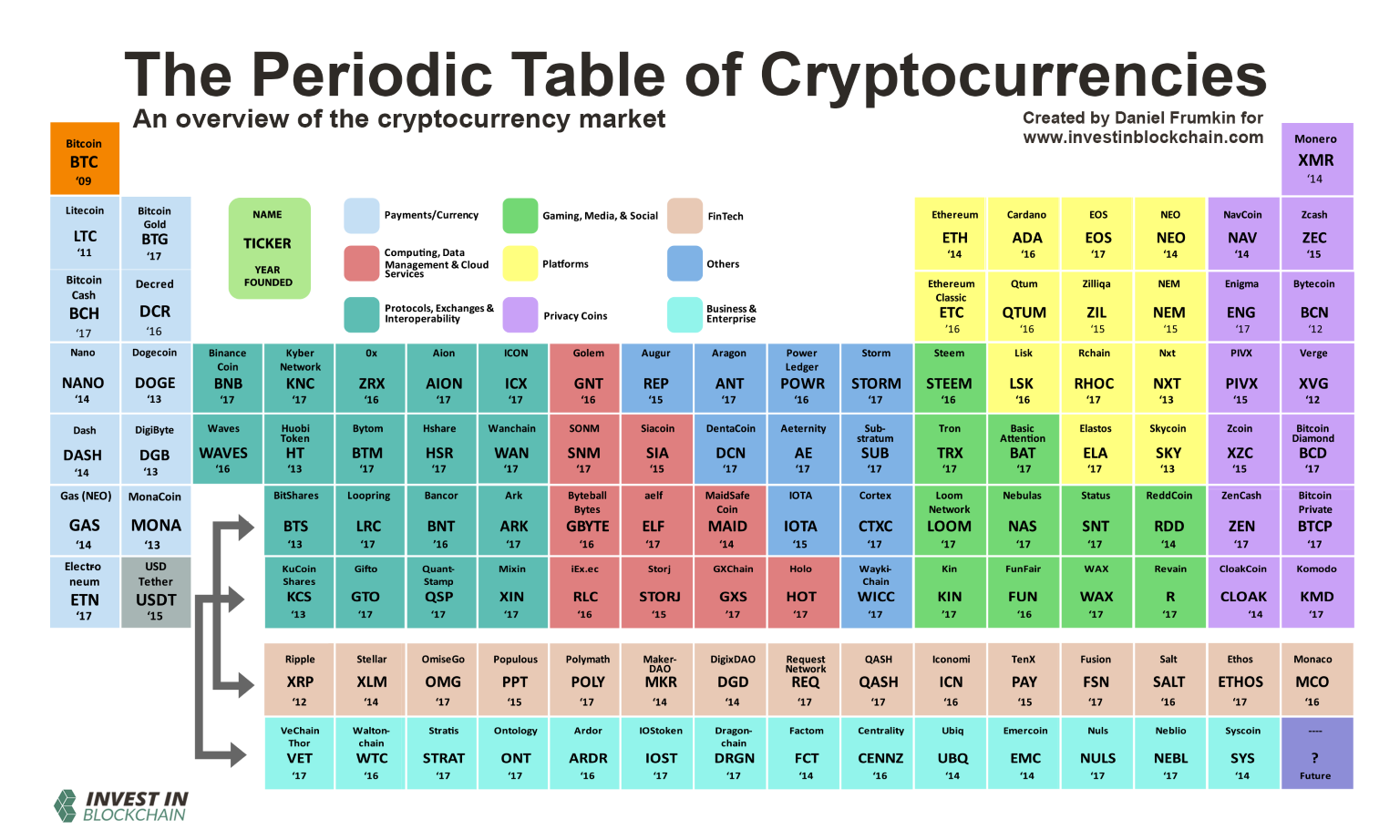
Cryptocurrency Exchanges
Because of the development of cryptocurrencies, many OTC exchanges and trading platforms have appeared in recent years. Some are serious projects, with well-drafted terms of use and compliance rules, others may be incorporated in places such as Vanuatu or Belize.
Main factors to consider:
Cryptocurrencies traded and volumes
- Liquidity issues
- Differences in pricing and exchange rates
- Conversion to fiat currencies
Compliance efforts
- Some cryptocurrency exchanges are making efforts to get regulated or licensed, in line with international AML/KYC standards, while some have become known for being less reputable. Many banks and service providers will maintain their own lists.
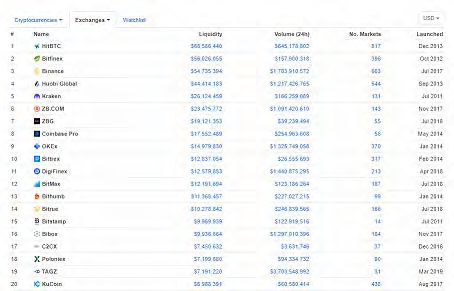
Custody, AML/KYC and other services
Specialized administrators, accountants, custodians and AML/KYC compliance providers have started to appear over the last two years.
Other trends:
- Tokenized funds.
- Shares or bonds issued on the Blockchain.
- Classic funds investing in cryptocurrencies and Blockchain start-ups (either directly or via tokens purchased in ICOs).
- Blockchain business incubators, VC investments, and big companies investing in Blockchain technologies (AMEX, Mizuho, Tencent, Alibaba, Prudential, Intesa Sanpaolo, ING, Morgan Stanley, RBC, AXA, Santander, Walmart, Allianz, BNP Paribas, Bank of China, Wells Fargo, BoA, JPMorgan Chase, China Construction Bank Corporation and ICBC).

Official exchanges trading cryptocurrencies-based products
Some of the established capital markets exchanges have accepted to trade certain cryptocurrencies.
CME now has Bitcoin futures and Cryptocurrency Indices
- standardized reference rates and spot price indexes on bitcoin and ether
- possible to hedge bitcoin exposure with a futures contract
- reference rate and real-time index for each cryptocurrency are standardized and based on robust methodology, with expert oversight to bring confidence to bitcoin and ether trading
- several exchanges and trading platforms will provide pricing data, including Bitstamp, Coinbase, itBit and Kraken
- SIX Swiss Exchange, based in Zurich, Switzerland's principal stock exchange
- Crypto Market Index 10 which aims to reliably measure the performance of the largest and most liquid crypto assets and tokens
- prices for the crypto assets and tokens are obtained from multiple exchanges
- Crypto Market Index 10 was standardized at 1000 points on 30 December 2016, and has been calculated on an ongoing basis since 9 January 2018
- On 30 August 2018, Deutsche Börse announced that it established a new area “DLT, Crypto Assets and New Market Structures” that will focus on the further development of a Group-wide approach to take advantage for Blockchain-related growth opportunities.
- The Australian Securities Exchange (ASX) has announced that it will be using Blockchain technology.
And many others...
Risk Factors
There are certain specific risk factors which should be disclosed and mitigated when investing in Bitcoin or other cryptocurrencies.
Specific risk factors that investors should be aware of:
Loss or destruction of private keys
Bitcoins (or other cryptocurrencies) are stored in a digital wallet and are controllable only by the possessor of both the public key and the private key relating to the digital wallet, both of which are unique.
If the private key is lost, destroyed or otherwise compromised, an investor may be unable to access the bitcoins held in the related digital wallet which will essentially be lost.
If the private key is acquired by a third party, then this third party may be able to gain access to the bitcoins.
Other cyber-security risks including malicious activity
Trading platforms and third-party service providers may be vulnerable to hacking or other malicious activities.
If one or more malicious actor(s) obtain control of sufficient consensus nodes on the Bitcoin Network or other means of alteration, then a Blockchain may be altered. While the Bitcoin Network is decentralized, there is increasing evidence of concentration by creating of “mining pools” and other techniques, which may increase the risk that one or several actors could control the Bitcoin Network or other similar Blockchain.
Risks associated with peer-to-peer transactions
Digital currencies can be traded on numerous online platforms, through third party service providers and as peer-to-peer transactions between parties.
Many marketplaces simply bring together counterparties without providing any clearing or intermediary services and without being regulated.
In such a case, all risks (such as double-selling) remain between the parties directly involved in the transaction.
Risk Factors (Continued)
Specific risk factors that investors should be aware of:
Other risks related to trading platforms and exchanges
Digital currency trading platforms, largely unregulated and providing only limited transparency with respect to their operations, have come under increasing scrutiny due to cases of fraud, business failure or security breaches, where investors could not be compensated for losses suffered.
Although one does not need a trading platform or an exchange to trade bitcoins or other cryptocurrencies, such platforms are often used to convert fiat currency into cryptocurrency, or to trade one cryptocurrency for another.
Loss of confidence in digital currencies
Digital currencies are part of a new and rapidly evolving “digital assets industry”, which itself is subject to a high degree of uncertainty.
For a relatively small use of digital currencies in the retail and commercial marketplace, online platforms have generated a large trading activity by speculators seeking to profit from the short-term or long-term holding of digital currencies.
Most cryptocurrencies are not backed by a central bank, a national or international organization, or assets or other credit, and their value is strictly determined by the value that market participants place on them.
Regulations preventing or restricting trading of digital currencies
There are significant inconsistencies among various regulators with respect to the legal status of digital currencies. Regulators are also concerned that bitcoin and other cryptocurrencies may be used by criminals and terrorist organizations.
In the future, certain countries may restrict the right to acquire, own, hold, sell or use digital currencies. This happened in China, but also in other countries.
Risk Factors (Continued)
Specific risk factors that investors should be aware of:
Currency-conversion risks
Policies or interruptions in the deposit or withdrawal of fiat currency into or out of the trading platforms may impact the ability of certain investors to convert.
For example, when two of the largest trading platforms in China stopped margin lending and withdrawals in February 2017 and started implementing stricter anti-money laundering policies following discussions with Chinese authorities, this immediately triggered a decrease in pricing and trading volume.
Slow-down of network
For bitcoins, mining is the process by which bitcoins are created and transactions verified. Miners which are successful in adding a block to the Blockchain are automatically awarded bitcoins (plus transaction fees for transactions recorded).
However, if the rewards for solving blocks and transaction fees are not sufficiently high, or if a high volume of transactions occur at the same time, the Blockchain may experience a slow- down. A slow-down is also possible for other cryptocurrencies, if the number of transactions on the Blockchain is very high.
Dilution due to competition or “fork” in the Blockchain
Dissent between users as to protocols to be used may result in a “fork”, opening two separate networks.
In 2016, Ethereum experienced a permanent fork in its Blockchain that resulted in two versions of its digital currency, Ethereum (ETH) and Ethereum Classic (ETC), which trade very differently.
Risk Factors (Continued)
Self-regulation efforts. Recommendations from the NFA (the U.S. National Futures Association):
The risks associated with the unique features of virtual currencies should be explained.
Certain virtual currencies have experienced daily price volatility of more than 20%. The risks associated with the extreme price volatility and the possibility of rapid and substantial price movements, which could result in significant losses, should be explained.
The lack of a centralized pricing source poses a variety of valuation challenges. The valuation and liquidity risks and the procedures used for valuing virtual currencies and the related risks should be explained.
Unlike bank and brokerage accounts, virtual currency exchanges and custodians that hold virtual currencies do not always identify the owner. The opaque underlying or spot market poses asset verification challenges for market participants, regulators and auditors and gives rise to an increased risk of manipulation and fraud, including the potential for Ponzi schemes, bucket shops and pump and dump schemes. The risks associated with the opaque nature of the underlying or spot virtual currency market should be explained.
Virtual currency exchanges, as well as other intermediaries, custodians and vendors used to facilitate virtual currency transactions, are relatively new and largely unregulated.
Virtual currency exchanges generally purchase virtual currencies for their own account on the public ledger and allocate positions to customers through internal bookkeeping entries while maintaining exclusive control of the private keys. Virtual currency exchanges collect large amounts of customer funds for the purpose of buying and holding virtual currencies on behalf of their customers.
A virtual currency exchange may not hold sufficient virtual currencies and funds to satisfy its obligations and that such deficiency may not be easily identified or discovered. In addition, many virtual currency exchanges have experienced significant outages, downtime and transaction processing delays.
Related Publications
 22 Mar 2024
Key factors for launching a virtual assets business in the BVI
The British Virgin Islands (“BVI”) continues to attract virtual assets businesses seeking to capitalize on its status as a leading offshore financial centre.
Read More
22 Mar 2024
Key factors for launching a virtual assets business in the BVI
The British Virgin Islands (“BVI”) continues to attract virtual assets businesses seeking to capitalize on its status as a leading offshore financial centre.
Read More
 29 Feb 2024
GDPR and the Cayman Islands’ Data Protection Act, 2021 – a comparison
The EU’s General Data Protection Regulation (“GDPR”) applies to offshore investment funds with European investors. The Cayman Islands Data Protection Act, 2021 (“DPA”), regulates the processing of all personal data. Inspired...
Read More
29 Feb 2024
GDPR and the Cayman Islands’ Data Protection Act, 2021 – a comparison
The EU’s General Data Protection Regulation (“GDPR”) applies to offshore investment funds with European investors. The Cayman Islands Data Protection Act, 2021 (“DPA”), regulates the processing of all personal data. Inspired...
Read More
 26 Feb 2024
Cayman Islands Monetary Authority publishes AML/CFT Activity Report for 2022
The Cayman Islands Monetary Authority has recently published its annual AML/CFT Activity Report for 2022. This brief covers a few points worth noting.
Read More
26 Feb 2024
Cayman Islands Monetary Authority publishes AML/CFT Activity Report for 2022
The Cayman Islands Monetary Authority has recently published its annual AML/CFT Activity Report for 2022. This brief covers a few points worth noting.
Read More
 22 Feb 2024
Legal Insight: Avoiding BVI law and Cayman Islands law pitfalls in banking & finance and corporate transactions
There are certain notorious pitfalls to avoid in the context of British Virgin Islands (“BVI”) and Cayman Islands banking & finance and corporate transactions. In this article, we examine five such pitfalls.
Read More
22 Feb 2024
Legal Insight: Avoiding BVI law and Cayman Islands law pitfalls in banking & finance and corporate transactions
There are certain notorious pitfalls to avoid in the context of British Virgin Islands (“BVI”) and Cayman Islands banking & finance and corporate transactions. In this article, we examine five such pitfalls.
Read More
 3 Nov 2023
Cayman Islands: an overview of Foundation Companies
The Foundation Companies Act 2017 (the “Act”) introduced a novel corporate vehicle to the Cayman Islands – the “Foundation Company”.
Read More
3 Nov 2023
Cayman Islands: an overview of Foundation Companies
The Foundation Companies Act 2017 (the “Act”) introduced a novel corporate vehicle to the Cayman Islands – the “Foundation Company”.
Read More
 30 Oct 2023
Cayman Islands removed from FATF Grey list
By way of an update on our recent publication the Financial Action Task Force had determined that the Cayman Islands has substantively fulfilled its action plan, and the Cayman Islands has now been de-listed from the so-called “Grey list”.
Read More
30 Oct 2023
Cayman Islands removed from FATF Grey list
By way of an update on our recent publication the Financial Action Task Force had determined that the Cayman Islands has substantively fulfilled its action plan, and the Cayman Islands has now been de-listed from the so-called “Grey list”.
Read More
 26 Oct 2023
Cayman Islands: Key dates to terminate a Cayman company to avoid unnecessary fees for 2024.
If you are considering terminating a Cayman company by way of voluntary liquidation or strike-off, it is crucial to adhere to specific deadlines and procedures to avoid unnecessary fees for the year 2024.
Read More
26 Oct 2023
Cayman Islands: Key dates to terminate a Cayman company to avoid unnecessary fees for 2024.
If you are considering terminating a Cayman company by way of voluntary liquidation or strike-off, it is crucial to adhere to specific deadlines and procedures to avoid unnecessary fees for the year 2024.
Read More
 20 Oct 2023
Cayman Islands: Proposed Legislation to expand Cayman Islands’ beneficial ownership framework
The Beneficial Ownership Transparency Bill, 2023 (the “Bill”), which aims to streamline the Cayman Islands’ beneficial ownership framework and to enhance transparency.
Read More
20 Oct 2023
Cayman Islands: Proposed Legislation to expand Cayman Islands’ beneficial ownership framework
The Beneficial Ownership Transparency Bill, 2023 (the “Bill”), which aims to streamline the Cayman Islands’ beneficial ownership framework and to enhance transparency.
Read More
Legal Expertise
Read more about how our team of attorneys provides legal advice on Cayman Islands law and British Virgin Islands law in the following practice areas:










